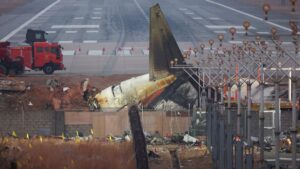Tragedy Strikes: Insights and Implications from the Jeju Air Flight 2216 Incident
On December 30, 2024, a catastrophic event unfolded at Muan International Airport in South Korea as Jeju Air Flight 2216 crashed, resulting in the loss of 179 lives among its 181 passengers. This harrowing incident has shaken the aviation community and raised questions about safety standards across airline operations, particularly concerning the Boeing 737-800 model, which has been a mainstay in commercial aviation.
The Incident Overview
As the Boeing 737-800 attempted to land, it failed to deploy its landing gear, skidding off the runway and colliding with a wall before erupting into flames. Among the tragic losses were 177 passengers and 2 crew members who heroically escaped. Early reports indicated that moments before the accident, the pilot reported a "bird strike" shortly after being warned about bird activity in the area, leading to vital implications for aviation safety protocols.
The South Korean government moved swiftly to order a comprehensive inspection of all domestic 737-800 aircraft, with Acting President Choi Sang-mok emphasizing the need for an immediate reassessment of the entire airline operation system amid growing public concern.
Investigation Underway
The investigation into this devastating crash involves collaboration between multiple agencies, including the U.S. National Transportation Safety Board and Boeing, who have sent teams to assist South Korea’s Aviation and Railway Accident Investigation Board. Two black boxes have been recovered and are now being analyzed for crucial data that may shed light on the aircraft’s failure to deploy its landing gear.
While design flaws were initially suspected, aviation experts assert that the Boeing 737-800 has one of the strongest safety records among narrow-body commercial aircraft, with approximately 4,400 units currently in service worldwide. This situation contrasts starkly with the troubled history of the Boeing 737 Max and raises important questions about flight preparation, maintenance, and immediate operational protocols.
The Broader Implications for Aviation Safety
In the wake of this incident, significant changes in regulatory oversight are expected. The Ministry of Land, Infrastructure, and Transport (MOLIT) revealed plans to enhance regulations regarding bird strikes, which have been identified as a potential cause of the crash. Ju Jong-wan, a director at MOLIT, stated they would carefully examine compliance with maintenance and operational records—underscoring the need for stricter adherence to aviation safety protocols.
Given that Jeju Air operates the largest fleet of 737-800s in South Korea, with 39 aircraft, the airline’s response will have wider implications for the industry. Acknowledging the urgency and severity of the situation, Jeju Air’s management committed to supporting the victims’ families while denying any mechanical faults contributed to the accident.
Market Reactions
In the aftermath of the crash, the impact on Jeju Air’s stock was immediate and significant, with shares dropping 8.65% to an all-time low on reports of the tragedy. Attention is now on how this incident may influence investor confidence across the aviation sector, particularly regarding low-cost carriers that often operate under tighter margins and scrutiny.
Paul Charles, CEO and travel analyst at The PC Agency, noted, "Over 200 airlines globally chose to operate the Boeing 737-800 in the last year, indicating confidence in its safety. However, every airline’s operational history will be under the microscope." This presents an opportunity for Extreme Investor Network readers to closely watch the market movements and operational adjustments made by airlines to manage this crisis.
Conclusion: Vigilance in Aviation
As we absorb the gravity of this incident, it serves as a poignant reminder of the role that safety plays in the aviation industry. At the Extreme Investor Network, we endeavor to analyze how such events not only affect public safety perceptions but also influence market dynamics and investment strategies within the airline sector.
Continued vigilance and rigorous safety inspections are paramount as we navigate these turbulent skies, and our thoughts remain with the victims and families affected by this tragedy. The coming weeks will be critical in shaping the future of airline safety regulations and operational protocols—stay tuned for our in-depth analysis and coverage on the situation as it develops.

